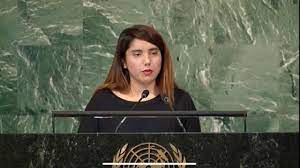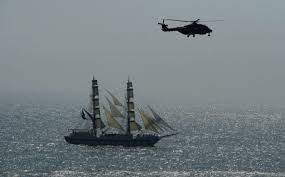Pakistan calls for “urgent action” to improve governance of oceans

United Nations: As the world faces a global emergency of the oceans, Pakistan has called for urgent action to improve the governance of the oceans as their “sustenance and sustainability” was inextricably linked with the achievement of all the 17 SDG’s and the 2030 Agenda.
“We need to take urgent action. Improving the governance of the oceans and strengthening legal frameworks are essential to preserve international peace and security, interconnectivity, the blue economy, and the timely achievement of the SDGs,” said Pakistani delegate Second Secretary Rabia ijaz in her statement at UN General Assembly’s meeting on the Agenda Item 72 (a) Oceans and the Law of the Sea held on Friday.
Pakistan also emphasised the strengthening of legal frameworks to preserve international peace and security, interconnectivity, the blue economy, and the timely achievement of the SDGs.
The delegate told the meeting that the world currently faced a global emergency of the Oceans which were under relentless threat from human activities.
“Sea levels are rising, coastal erosion is worsening, marine pollution is increasing, marine biodiversity is rapidly declining, and the Ocean is warmer and more acidic,” she said.

The second secretary said that since its inception, the UN Convention of the Law of the Sea (UNCLOS) had played a fundamental role in promoting legal order and peace in the oceans, as well as ensuring the harmonious and judicious use of ocean resources for all mankind.
“Pakistan also attaches great importance to the work of the three bodies established under UNCLOS – the International Tribunal for the Law of the Sea, the Commission on the Limits of the Continental Shelf (CLCS) and the International Seabed Authority (ISA),” Rabia Ijaz remarked.
She said it was essential to balance the need for resource extraction with the preservation of the marine environment and stressed the need for developing a robust and comprehensive regime for exploitation before the commencement of the mining anywhere in the “Area”.
The Pakistani delegate also underlined the need for addressing the question of the possible hazardous impact on marine ecosystems which necessitated continuous negotiations in “good faith” in light of the best available science.
She said as the coordinator of the Group of 77 and China for this year, Pakistan appreciated the progress made during the IGC-4 and IGC-5 to finalize the draft treaty under UNCLOS on the conservation and sustainable use of marine biological diversity beyond national jurisdiction (BBNJ) and look forward to reconvening of the next session.
The delegate stressed that the principle of the common heritage of mankind should guide and underpin the new legal regime for the conservation and sustainable use of marine biological diversity of areas beyond national jurisdiction.
She told the meeting that the idea of a ‘Blue Economy’ recognized the seas and oceans as main drivers of economic development with great potential for innovation and growth.
“Pakistan’s interest in the Blue Economy emanates from coastline of over 1000 kilometers, an extended continental shelf, an Exclusive Economic Zone (EEZ) of around 290,000 square kilometers and 2 major ports – Karachi and the newly built deep seaport at Gwadar.”
She said the Indian Ocean offered the promising potential for mutual cooperation and collaboration. But geostrategic competition and the pursuit of military dominance by some States could gravely jeopardize that potential.
She said the international community needed to be cognizant of the fact that any military conflict in South Asia could endanger stability in a region that was critical for global trade and global peace and security.
“We are also concerned at the politicization of the issues related to the South China Sea. The resolutions of the disputes related to the South China Sea are between the countries concerned. Those outside the region should respect the negotiations and the process through which the parties concerned wish to resolve their disputes.”
The delegate reiterated that the Government of Pakistan was fully committed to 2030 Agenda, including SDG 14 pertaining to conservation and sustainable use of oceans and was open to cooperate and collaborate with other friendly nations for this purpose.





